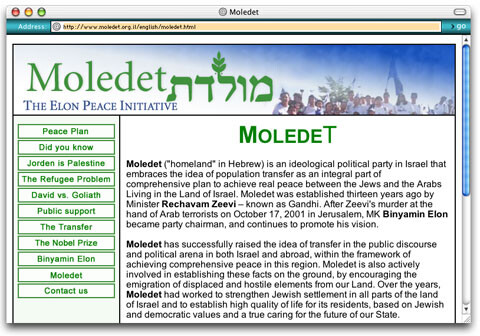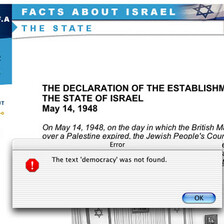The Electronic Intifada 3 March 2003

Above: Cars with an Israeli flag and placards in English and Hebrew reading “expel the Arab enemy” drive through the center of Jerusalem Sunday, March 17, 2002, while U.S. envoy Anthony Zinni continued his efforts to broker a cease-fire agreement between Israel and the Palestinians. (AP Photo/Peter Dejong)
The National Union is an alliance of three small parties: Moledet, Tekuma and Yisrael Beitenu. Moledet calls openly for “solving” the Palestinian-Israeli conflict by forcing millions of Palestinians out of their homeland, while the National Union’s joint platform states that all three parties espouse “transfer” and “population exchange.”
On its website, Moledet, led by Benny Elon, states that the party, whose name means “homeland,” is “an ideological political party in Israel that embraces the idea of population transfer as an integral part of comprehensive plan [sic] to achieve real peace between the Jews and the Arabs Living in the Land of Israel.”
The party boasts that, “Moledet has successfully raised the idea of transfer in the public discourse and political arena in both Israel and abroad.” The party claims total ethnic cleansing offers a “solution” to the Palestinian-Israeli conflict that is both “practical” and “moral.”

Above: Detail from Moledet’s homepage boasting that “Moledet has successfully raised the idea of transfer in the public discourse and political arena in both Israel and abroad.”
To justify a policy that fits the international legal definition of genocide, Elon, in an undated article posted on the Moledet website entitled “Breaking the Transfer Taboo,”quotes Leviticus from the Bible: “And I will give peace in the Land, and you shall lie down, and none shall make you afraid; and I will remove evil beasts from the land and the sword shall not go through your land.”
The implication is that Palestinians are a sub-human race who can be treated like “evil beasts.” Moledet believes that “The two sides of the Jordan River, comprising the Biblical Land of Israel and Balfour’s Palestine, are both rightfully ours,” but concedes that it is willing to allow the Palestinians to be expelled to the east of the river, in other words to Jordan.

Above: Rehavam Ze’evi.
The three National Union parties’ combined platform states, “Within the framework of any agreement, it is necessary to solve the Palestinian refugee problem — refugees who have spent the past 55 years in refugee camps. The proposed solution is transfer by agreement (population exchange) by which the refugees would be settled in Arab countries in place of Jews who emigrated to Israel from these countries.” In addition to millions of Palestinians in surrounding countries, the vast majority of Palestinians in Gaza, and almost two-fifths of Palestinians in the West Bank are refugees.
The National Union’s frank call for expelling the Palestinians by force or “voluntarily” by depriving them of rights and jobs fits the legal definition of genocide contained in the 1948 Convention on the Prevention and Punishment of the Crime of Genocide. Despite this, no coverage that we saw in the US media did more than note the group’s policies in a sentence, and many reports simply skipped over its views.
Major press ignore ethnic cleansing platforms
The New York Times’ Greg Myre reported on 26 February that the National Union is the “most extreme” of the four parties in Ariel Sharon’s new coalition, and that “Party leaders have called for ousting Yasir Arafat, the Palestinian leader, and expelling Palestinians from the West Bank and the Gaza Strip and annexing the land to Israel.” (“Sharon seals deal with one more party to firm up coalition,” New York Times, 26 February 2003)
In later reports, however, The New York Times dropped references to the ethnic cleansing policies, lumping the National Union together with the National Religious Party which, though it opposes a Palestinian state and supports continued colony construction, has not openly advocated transfer. On 28 February, after Sharon’s new coalition was confirmed, Myre stated only that “two far-right groups, the National Union and the National Religious Party, reject a Palestinian state under any circumstances.” (“Sharon’s new government increases pressure on Arafat,” New York Times, 28 February 2003)
Referring to the same two parties, The New York Times’ James Bennet reported on 2 March that, “Mr. Sharon created his coalition with the participation of two parties that oppose any Palestinian state — a declared goal of Mr. Bush and a declared concession of Mr. Sharon — and that passionately support the settler movement, which the United States has traditionally considered an obstacle to peace.” Omitting any reference to transfer, Bennet quoted an Israeli political analyst saying that for Sharon these two parties “are not far right.” Rather, “those are people who believe in things that are not far from his heart.” (“A pivot point for the Middle East,” New York Times, 2 March 2003)

Above: Jörg Haider.
In The Washington Post, John Ward Anderson made no mention of the National Union’s expulsion platform when he reported that Sharon’s coalition “embraces the secular Shinui Party, with 15 seats; the pro-settlement National Religious Party, with six seats; and the ultranationalist National Union party, with seven seats.” Anderson then elaborated that, “Thirteen of the 68 seats thus belong to a pair of parties that adamantly oppose an independent Palestinian state and are longtime champions of expanding Jewish settlements in the West Bank and Gaza Strip, two issues that have fueled the uprising.” (“Sharon forms new coalition in Israel,” Washington Post, 26 February 2003)
The Chicago Tribune glossed over the National Union’s pro-ethnic cleansing agenda, reporting prior to the coalition’s formation that, “Talks are continuing on the possible entry of the National Union, a far-right party that is balking at Sharon’s acceptance of a future Palestinian state.” (“Sharon shuts out ultra-Orthodox,” Chicago Tribune, 25 February 2003).
The next day, the Tribune reported that a deal had been reached to bring into the coalition, “the centrist Shinui Party, the right-wing National Union Party and the National Religious Party, which is a champion of Jewish settlements on occupied land.” No mention was made of the National Union and its constinuent parties’ embrace of ethnic cleansing. The new government’s “rightist leanings,” the Tribune report continued, “could complicate international efforts to end nearly 2 1/2 years of Israeli-Palestinian violence.” (“Sharon strikes deal on new coalition,” 26 February 2003)
The Boston Globe’s Dan Ephron wrote that Sharon opted “to partner with two rigidly right-wing parties — the National Union and the National Religious Party — along with the centrist and doggedly secular Shinui, which campaigned on a promise to dislodge ultra-Orthodox Jews from power.”
Thus for Ephron, Shinui’s entirely domestic agenda is more worthy of elaboration than the National Union’s determination to address one of the world’s longest-standing conflicts by the commission of massive crimes against humanity. The extraordinary headline for this article was “Sharon ousts rival from post; analysts view change in Israel’s leadership as aid to peace effort.” (Boston Globe, 27 February 2003) Not only did the Globe ignore the ethnic cleansers key platform, but it managed to portray their inclusion in Israel’s cabinet as promoting peace!
Newspapers play down ethnic cleansers’ goals
Some US newspapers did explicitly mention the National Union’s stand in favor of expelling the Palestinians, but none we could find devoted more than a sentence to the matter.
The Atlanta Journal-Constitution, for instance, reported on 28 February that, “Two parties in Sharon’s four-party coalition, the National Religious Party and National Union, oppose Palestinian independence,” and added, “some National Union leaders have advocated exiling the 3 million Palestinians to Egypt and annexing the West Bank and Gaza Strip to Israel.” (“Israel shifts emphasis from peace to economy,” Atlanta Journal-Constitution, 28 February 2003)
The Los Angeles Times reported that, “the National Union, advocates moving Palestinians en masse from the West Bank and Gaza Strip to neighboring Arab countries, and the other, the National Religious Party, is a champion of expanding Jewish settlements rather than moving to disband them, which many Israelis believe will be a necessary part of any peace settlement with the Palestinians.” (“In Israel, old problems confront new coalition,” Los Angeles Times, 28 February 2003)
At least two newspapers considered the formation of a government with ethnic cleansers to be worthy of editorial comment. The Baltimore Sun noted in its editorial that the National Union “advocates the expulsion of Palestinians from the West Bank and Gaza and the annexation of the land by Israel.” It added tamely that, “that’s not a formula for fruitful dialogue.” (“Sharpening the talons,” Baltimore Sun, 27 February 2003) By comparison, however, the Baltimore Sun’s analysis of the new Israeli government was far more incisive than most American newspapers.
Similarly, a San Francisco Chronicle editorial observed that “some” National Union members “want to expel Palestinians from the West Bank and Gaza Strip.” Therefore, in the newspaper’s analysis, the party’s inclusion in the government “would make the path to peace even more rocky.” (“Sharon’s hard-line team,” San Francisco Chronicle, 26 February 2003)
CNN reported minimally and confusingly on 23 February that the “dovish” Labor party “dropped out of a coalition that included the ultra-Orthodox Shas party and the National Unity or Yisrael Beitenu Party [sic], a nationalist party that favors removal of Palestinians.” On 24 February CNN’s Jerrold Kessel omitted any mention of the National Union’s platform, but commented in perhaps the greatest understatement that, “Sharon’s coalition may affect peace moves.”
This ultra-light touch contrasts with how CNN covered the furor over the inclusion of the Freedom Party in Austria’s government in 2000. Then, there were many reports on that topic, and on 5 February 2000, Austria’s ambassador to the United States, Peter Moser, was aggressively quizzed by CNN anchor Gene Randall. Randall put it to the ambassador that the Freedom Party’s critics see it as “a far-right extremist group, whose rise to power could encourage a wave of neo-Nazi activities in Austria.” When the ambassador objected to the label “neo-Nazi,” Randall fired back, “Well how would you characterize the Freedom Party, Mr. Ambassador?” When Moser appealed that Austria should be given a chance to prove its democratic credentials, Randall asked, “How long a chance? How long, in your view, will it take before this government proves what it’s saying exists and that it is in adherence to democratic principles?”
So far no Israeli official, as far as we can determine, has been questioned on American television and asked to defend the inclusion of parties which ran for election on a platform that includes the sorts of policies for which Slobodan Milosevic is currently on trial in the Hague.
Similarly, while the National Union’s literally genocidal (according to international legal standards) policy passes without comment, US newspapers and electronic media frequently assert that certain Palestinians groups that clearly have neither the means to do so, nor share a seat in official Palestinian institutions, “aim to destroy Israel.” In addition to failing to report the true face of the National Union, no report we found included any substantial Palestinian reaction to what the inclusion of such parties in Israel’s government might mean, the fears it raises or the possible consequences for Palestinians.
Those media who did not entirely ignore the National Union’s policies, portray support for “transfer” as a phenomenon of the “extreme” or “ultranationalist” right. But such a representation masks much wider support for the policy. In the Winter 2002 issue of Middle East Report, Robert Blecher reported that according to,
“a March 2002 poll administered by Tel Aviv University, 46 percent of Israeli Jews supported the transfer of Palestinians from the West Bank and 31 percent advocated the same treatment for Palestinian citizens of Israel; 60 percent said they supported “encouraging” Palestinian Israelis to leave Israel; and a full 80 percent objected to the inclusion of Palestinian Israelis in decisions of national importance. Many believe that these numbers underestimate public support for transfer since many Israeli Jews are embarrassed to admit support for an unethical policy.”Blecher quotes Knesset member and former Israeli government minister Yuli Edelstein stating, “The results of the poll unfortunately reflect the reality I encounter almost every day…I hear it everywhere, and not just at funerals.” (“Living on the Edge: The Threat of “Transfer” in Israel and Palestine,” Middle East Report 225, Winter 2002)
While Israelis can hear of this growing phenomenon everywhere, including in their media, the US media have being doing their best to ensure that Americans remain ignorant of the kinds of policies espoused by members of Israel’s new government, at a time when they are being asked to hand over billions more in extra US taxpayer aid to that country.
Related Links:




